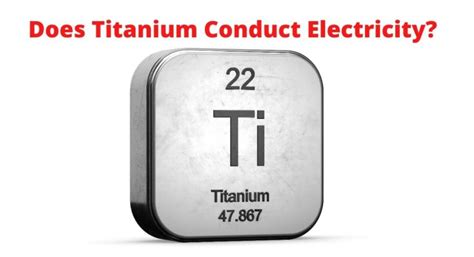Titanium, a metal known for its strength, corrosion resistance, and high strength-to-weight ratio, is often used in aerospace, medical, and industrial applications. One of the lesser-known properties of titanium is its electrical conductivity. But does titanium conduct electricity? In this article, we will delve into the world of titanium and electricity to reveal the shocking truth.
Titanium's Unique Properties
Before we dive into the electrical conductivity of titanium, let's first explore its unique properties. Titanium is a transition metal with an atomic number of 22 and a symbol of Ti. It has a high melting point of 1668°C (3034°F), making it ideal for high-temperature applications. Titanium is also highly corrosion-resistant due to its thin oxide layer, which forms when it comes into contact with air. This oxide layer provides a protective barrier against corrosion, making titanium an excellent choice for applications where exposure to harsh environments is a concern.
Electrical Conductivity: What Is It?
Electrical conductivity is the ability of a material to conduct electric current. It is measured in units of Siemens per meter (S/m) or Ohm-meter (Ω·m). The higher the electrical conductivity of a material, the better it is at conducting electric current. Electrical conductivity is an essential property in materials science, as it determines the suitability of a material for various applications, including electrical wiring, electronics, and energy storage.
Titanium's Electrical Conductivity: The Shocking Truth
Now, let's get to the shocking truth: titanium is a poor electrical conductor. Its electrical conductivity is relatively low compared to other metals, with a value of around 1.5 x 10^6 S/m at room temperature. This means that titanium is not suitable for applications that require high electrical conductivity, such as electrical wiring or electronics.
However, titanium's low electrical conductivity is not necessarily a disadvantage. In some applications, such as medical implants, titanium's low electrical conductivity is beneficial. Medical implants, such as pacemakers and hip replacements, require materials that are biocompatible and non-conductive to prevent electrical interference. Titanium's low electrical conductivity makes it an ideal material for these applications.
Why Is Titanium a Poor Electrical Conductor?
So, why is titanium a poor electrical conductor? The answer lies in its crystal structure. Titanium has a hexagonal close-packed (hcp) crystal structure, which is less efficient at conducting electric current than other crystal structures, such as face-centered cubic (fcc) or body-centered cubic (bcc). The hcp crystal structure of titanium results in a lower density of free electrons, which are the carriers of electric current. This means that titanium has fewer free electrons available to conduct electric current, resulting in lower electrical conductivity.
Practical Applications of Titanium's Low Electrical Conductivity
While titanium's low electrical conductivity may seem like a limitation, it has several practical applications. In addition to medical implants, titanium's low electrical conductivity makes it suitable for:
- Aerospace applications: Titanium's low electrical conductivity reduces the risk of electrical interference in aircraft and spacecraft.
- Marine applications: Titanium's corrosion resistance and low electrical conductivity make it ideal for use in seawater, where electrical conductivity can lead to corrosion.
- Industrial applications: Titanium's low electrical conductivity makes it suitable for use in high-temperature and high-corrosion environments, such as in chemical processing and power generation.
Gallery of Titanium's Unique Properties






FAQs
What is titanium's electrical conductivity?
+Titanium's electrical conductivity is relatively low, with a value of around 1.5 x 10^6 S/m at room temperature.
Why is titanium a poor electrical conductor?
+Titanium's poor electrical conductivity is due to its hexagonal close-packed (hcp) crystal structure, which results in a lower density of free electrons.
What are some practical applications of titanium's low electrical conductivity?
+Titanium's low electrical conductivity makes it suitable for medical implants, aerospace applications, marine applications, and industrial applications.
In conclusion, titanium's low electrical conductivity is a unique property that makes it suitable for various applications. While it may not be the best conductor of electricity, its other properties, such as high strength, corrosion resistance, and biocompatibility, make it an excellent choice for many industries. Whether you're an engineer, a scientist, or simply someone interested in learning more about titanium, we hope this article has provided you with a deeper understanding of this fascinating metal.
